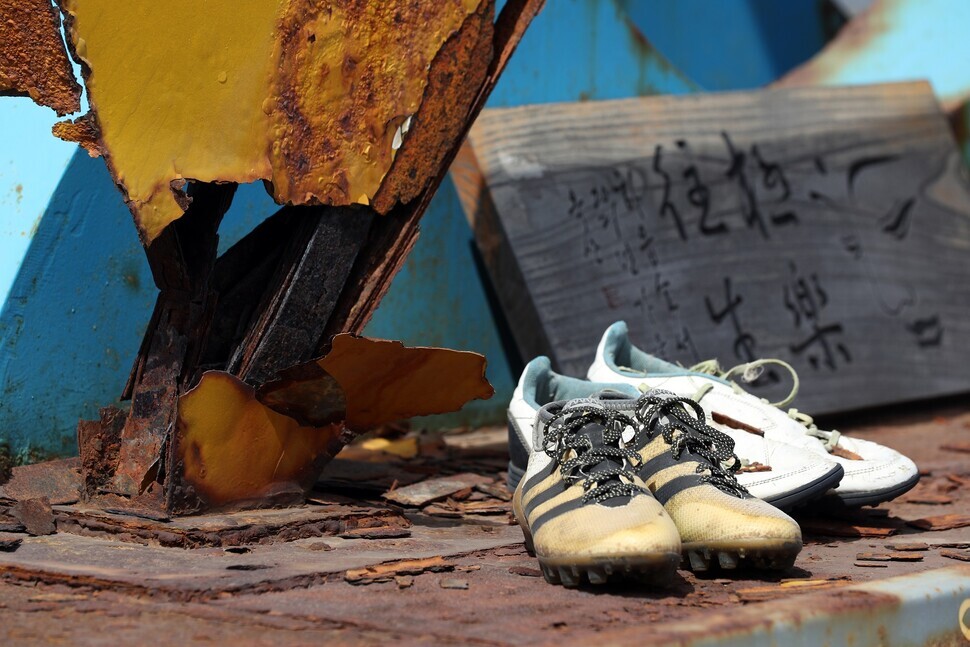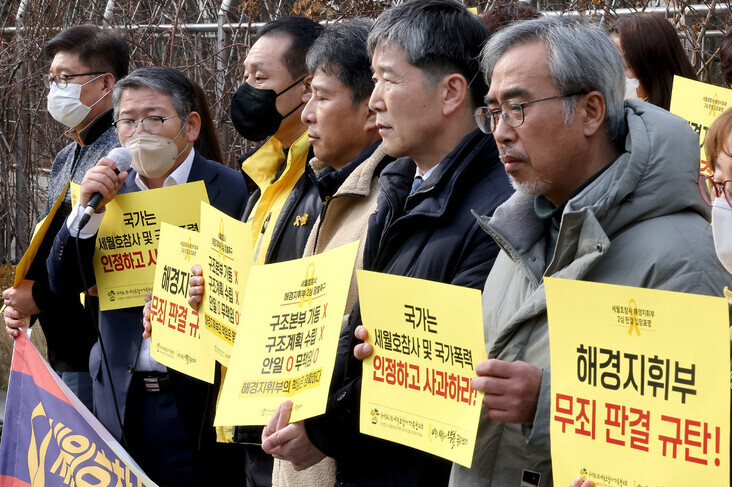hankyoreh
Links to other country sites 다른 나라 사이트 링크
Sewol sinking: 9 years passed, 304 lives lost, 1 negligence conviction

Nine years have passed since the tragedy of the Sewol ferry sinking in which 304 people, most of whom were high school students on a school trip, lost their lives due to inadequate rescue efforts. However, the trials to hold those responsible for the catastrophe to account are still underway.
The criminal trials related to the Sewol disaster are divided into three main areas: (1) the cause of the sinking by private parties such as the Sewol’s captain and Cheonghaejin Marine, (2) the failure to rescue by the Coast Guard Vessel 123 and the Coast Guard command, and (3) secondary offenses such as the Defense Security Support Command’s alleged spying on the bereaved families.
While the trials of the ferry’s captain and Chaeonghaejin Marine concluded with declarations of guilt in 2016, a case seeking to hold the state responsible for failing to rescue the passengers and another concerning secondary offenses are being heard by the Supreme Court.
According to coverage by the Hankyoreh on Sunday, Kim Kyung-il, the former captain of Coast Guard Vessel 123, is the only member of the Coast Guard who has been found guilty in regard to the Sewol case in the past nine years.
A total of 11 Coast Guard officers were indicted over the failed rescue, but only Kim Kyung-il, the field commander who first arrived at the accident site, was sentenced to three years in prison after being indicted in 2014.
In 2020, 11 members of the Coast Guard command, including then-Commissioner General Kim Seok-kyun, who was belatedly brought to trial on charges of professional negligence and manslaughter, were acquitted in the courts of first and second instances, and the case is being appealed in the Supreme Court.
In the 2015 trial of Kim Kyung-il, the court sentenced him to three years in prison, ruling, “It would be cruel to hold the defendant solely responsible for neglecting to rescue the passengers, as the Coast Guard command was also jointly responsible through their neglect to train Coast Guard officers on emergencies.”
But in 2023, the court refused to recognize the responsibility of the 11 Coast Guard commanders, including Kim Seok-kyun, saying, “It cannot be said that the defendants failed to exercise due diligence in their duties merely because they failed to lead the rescue in the best possible way, such as instructing the passengers to leave the ship after arriving at the scene of the accident.”
The issue in the trial was whether the failure to take measures to evacuate the passengers constituted professional negligence. The first and second trials ruled that they could be reprimanded for “management responsibility for a situation where the Coast Guard’s system was not prepared for a large-scale casualty accident,” but that it was difficult to find them criminally liable.

“If they [the Coast Guard command] had been prosecuted in 2014 or 2015, right after the Sewol tragedy, it is likely that they would have been convicted,” said Lee Jeong-il, a lawyer with Minbyun-Lawyers for a Democratic Society, which represents victims’ families and citizens in disaster-related lawsuits and complaints. “This is due to the loss of key evidence over the years and waning public interest.”
At the time of the disaster, the Park Geun-hye administration dragged its feet when it came to investigating the failed rescue, so the joint police/prosecutors’ investigation committee concluded its investigation by charging only Kim Kyung-il. Neither Kim Seok-kyun nor any of the other 10 members of the Coast Guard command were brought to trial until 2019, when a special team was established under the Moon Jae-in administration to investigate the Sewol tragedy.
In fact, Kim Seok-kyun went back on his initial statements in court, and the court accepted his courtroom testimony and did not find him negligent. When, during a 2015 open hearing on the Sewol disaster, it was pointed out that he was not in the situation room at the time of the accident (8:49 am) and could not carry out rescue activities, he claimed that he was in the situation room at 9:10 am. But in 2021, he modified his testimony, saying he entered the situation room at 9:28 am. Based on his courtroom testimony, the first trial found that Kim “took measures such as trying to communicate with the Sewol.”
In addition to avoiding responsibility for the failure of the rescue, the state also engaged in “secondary offenses” against the bereaved families. In 2018 and 2019, six officers belonging to the Defense Security Command (DSC, now the Defense Counterintelligence Command) who illegally surveilled the families of the disaster’s victims were brought to trial and convicted in the first and second trials.
As criticism of the Park administration mounted over its initial failure to respond, the DSC organized a Sewol task force and reported the situation of the bereaved families to the DSC leadership and the Blue House.
The appeal trial revealed that as time went on, the intelligence collected by the task force focused on the families’ personal information, private lives, and the investigations the families participated in to discover the truth of the incident, and the scope of the collection was broadly and indiscriminately expanded.
Lee Byung-kee, Park’s former presidential chief of staff, and Cho Yoon-sun, former Blue House senior secretary for political affairs, were acquitted of interfering with the activities of the Special Investigation Commission on 4/16 Sewol Ferry Disaster in their second trial and are scheduled to be given a final verdict by the Supreme Court on April 27. They stand accused of obstructing the commission from voting on an agenda to investigate Park’s behavior during the seven hours she was unaccounted for on the day of the tragedy.
They were found guilty of abuse of office in the first trial, but acquitted in the second, with the court acknowledging that they had “violated the independence of the commission” but stating that “there was insufficient evidence that the act caused them to do something they were not obligated to do” under the law.
“If the truth of the Sewol tragedy had been revealed and those responsible had been punished, it would have been a lesson in itself,” said Park Jong-dae, father of the late Park Su-hyeon, a student at Danwon High School who died on the Sewol. “As seen in the Itaewon tragedy, all that the bureaucracy seems to be capable of is avoiding responsibility.”
By Jeong Hye-min, staff reporter
Please direct questions or comments to [english@hani.co.kr]

Editorial・opinion
![[Column] Welcome to the president’s pity party [Column] Welcome to the president’s pity party](https://flexible.img.hani.co.kr/flexible/normal/500/300/imgdb/original/2024/0515/3917157400447943.jpg) [Column] Welcome to the president’s pity party
[Column] Welcome to the president’s pity party![[Editorial] Korea must respond firmly to Japan’s attempt to usurp Line [Editorial] Korea must respond firmly to Japan’s attempt to usurp Line](https://flexible.img.hani.co.kr/flexible/normal/500/300/imgdb/original/2024/0514/2317156736305813.jpg) [Editorial] Korea must respond firmly to Japan’s attempt to usurp Line
[Editorial] Korea must respond firmly to Japan’s attempt to usurp Line- [Editorial] Transfers of prosecutors investigating Korea’s first lady send chilling message
- [Column] Will Seoul’s ties with Moscow really recover on their own?
- [Column] Samsung’s ‘lost decade’ and Lee Jae-yong’s mismatched chopsticks
- [Correspondent’s column] The real reason the US is worried about Chinese ‘overcapacity’
- [Editorial] Yoon’s gesture at communication only highlights his reluctance to change
- [Editorial] Perilous stakes of Trump’s rhetoric around US troop pullout from Korea
- [Guest essay] Preventing Korean Peninsula from becoming front line of new cold war
- [Column] The state is back — but is it in business?
Most viewed articles
- 1[Editorial] Transfers of prosecutors investigating Korea’s first lady send chilling message
- 2[Column] Welcome to the president’s pity party
- 3Unexpected rate of AI development requires timely discussion of side effects
- 4US has always pulled troops from Korea unilaterally — is Yoon prepared for it to happen again?
- 5Korean opposition decries Line affair as price of Yoon’s ‘degrading’ diplomacy toward Japan
- 6Could Korea’s Naver lose control of Line to Japan?
- 7[Column] Will Seoul’s ties with Moscow really recover on their own?
- 8Major personnel shuffle reassigns prosecutors leading investigations into Korea’s first lady
- 9Second suspect nabbed for gruesome murder of Korean in Thailand, 1 remains at large
- 10[Editorial] Korea must respond firmly to Japan’s attempt to usurp Line